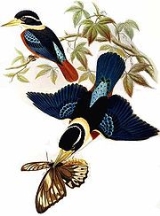
Rufous-bellied Kookaburra
Encyclopedia
The Rufous-bellied Kookaburra (Dacelo gaudichaud) is a species of kookaburra
which is widely distributed through the forests of lowland New Guinea
. It has also been recorded on Saibai Island, Queensland, Australia
.
This kookaburra is unusual in that it occupies dense rainforest
s (as opposed to the open country preferred by other kookaburras) and does not live in family groups but in pairs. It is a white-billed bird with a black cap, blue-tinged wings, and a pale rufous belly and tail feathers.
The scientific name commemorates the French botanist Charles Gaudichaud-Beaupré
.
Kookaburra
Kookaburras are terrestrial kingfishers native to Australia and New Guinea. They are large to very large, with a total length of . The name is a loanword from Wiradjuri guuguubarra, and is onomatopoeic of its call...
which is widely distributed through the forests of lowland New Guinea
New Guinea
New Guinea is the world's second largest island, after Greenland, covering a land area of 786,000 km2. Located in the southwest Pacific Ocean, it lies geographically to the east of the Malay Archipelago, with which it is sometimes included as part of a greater Indo-Australian Archipelago...
. It has also been recorded on Saibai Island, Queensland, Australia
Australia
Australia , officially the Commonwealth of Australia, is a country in the Southern Hemisphere comprising the mainland of the Australian continent, the island of Tasmania, and numerous smaller islands in the Indian and Pacific Oceans. It is the world's sixth-largest country by total area...
.
This kookaburra is unusual in that it occupies dense rainforest
Rainforest
Rainforests are forests characterized by high rainfall, with definitions based on a minimum normal annual rainfall of 1750-2000 mm...
s (as opposed to the open country preferred by other kookaburras) and does not live in family groups but in pairs. It is a white-billed bird with a black cap, blue-tinged wings, and a pale rufous belly and tail feathers.
The scientific name commemorates the French botanist Charles Gaudichaud-Beaupré
Charles Gaudichaud-Beaupré
Charles Gaudichaud-Beaupré was a French botanist.He was born in Angoulême, the son of J-J. Gaudichaud and Rose Gaudichaud. He studied pharmacology at Cognac and Angoulême. He also studied chemistry and herbology.His greatest claim to fame was serving as botanist on a circumglobal expedition from...
.

